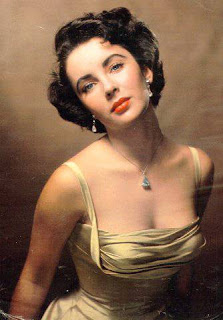Elizabeth Taylor
 As has been written by many people today, Elizabeth Taylor was one of the last of a certain type of movie star. A commenter on one Website noted that of the 50 top stars AFI named in 1999, only five are still living: Lauren Bacall, Kirk Douglas, Sophia Loren, Sidney Poitier, and Shirley Temple. Perhaps only Bacall recalls the kind of blackglama glamour of Hollywood's heydey, but she never dominated the entertainment news like Elizabeth Taylor did.
As has been written by many people today, Elizabeth Taylor was one of the last of a certain type of movie star. A commenter on one Website noted that of the 50 top stars AFI named in 1999, only five are still living: Lauren Bacall, Kirk Douglas, Sophia Loren, Sidney Poitier, and Shirley Temple. Perhaps only Bacall recalls the kind of blackglama glamour of Hollywood's heydey, but she never dominated the entertainment news like Elizabeth Taylor did.I suppose one's impression of Taylor depends on one's age. Those under thirty probably know the name, but may have no idea of the kind of star she was. People over sixty-five will remember her at the height of her fame, when, from about 1950 to the late 1960s she was perhaps the most famous and talked about female celebrity in the world. For those in my age bracket, we remember her as someone our parents knew about, but we only knew from that reflection. My earliest memory of her was when the cover of Life magazine featured her on the cover because it was her fortieth birthday. This would have been 1972, when her career as an actress was largely over but her life as a legend was just entering another phase.
In 1972 I hadn't seen any of her movies, but I probably knew she was a movie star and was married to Richard Burton. Since then I've seen some of her movies, of course, but not that many. In fact, due to my recent tradition of taking a look at the top films from fifty years ago, I've seen three of her more celebrated films for the first time: Cat on a Hot Tin Roof; Suddenly, Last Summer; and Butterfield 8. Those constitute about half of all the Taylor films I've seen. I've never seen National Velvet, A Place in the Sun (both are at the top of my Netflix queue), Cleopatra, (her most iconic role) or any of her many films with Richard Burton except for Who's Afraid of Virginia Woolf, by all accounts her best film and her best performance. Oh, and I also saw Giant. I think that's about it.
From what I've seen, and I don't mean to be disrespectful, but Taylor was not a brilliant actress. A great star, yes. Her roles seem to blend into one, and as one writer pointed out, she didn't disappear into the character, the character disappeared into her. Only in Virginia Woolf, when she played the blowsy Martha, did she shed the Taylor persona and show glimpses of what she might have been capable of. Perhaps that just didn't interest her. From the mid-seventies on she pretty much ceased being a working actress, though looking over her filmography I see she did more than I remembered her doing. Unfortunately her last film role will remain The Flintstones, but she did also provide the voice for Maggie Simpson.
Despite her absence from the screen for most of the last thirty-five years of her life, she was always the quintessential Hollywood star. Her many marriages, her brushes with death, her friendship with Michael Jackson, her becoming the butt of Joan Rivers jokes, her admirable early work on behalf of HIV/AIDS research, all meshed to create someone so larger than life that it's hard to believe she wasn't concocted by a feverish writer.
When old-timers say that there aren't movie stars like there were in the old days, that's half bullshit. Of course there are stars now, and fifty years from now people will be saying they don't make them like George Clooney or Nicole Kidman anymore. But there is a certain cache that stars from before the advent of cable television, the Internet, and our fractured attention spans possess. It's easy to compare "Brangelina" with "Liz & Dick," but only in a matter of degrees. The swirl of gossip surrounding their courtship during Cleopatra, or the perceived theft of Eddie Fisher by Taylor from Debbie Reynolds, dwarfs anything in the tabloid media today. Stars were viewed far less cynically than they are today, more as Olympians than fodder for our Schadenfreude.
Elizabeth Taylor was ethereally beautiful, and she made a lot out of that. She was the stuff of late-night talk-show hosts routines, but she also did a lot of good. If she wasn't the greatest actress of her era, I do think her son is correct in saying that she made the world a better place.


Comments
Post a Comment